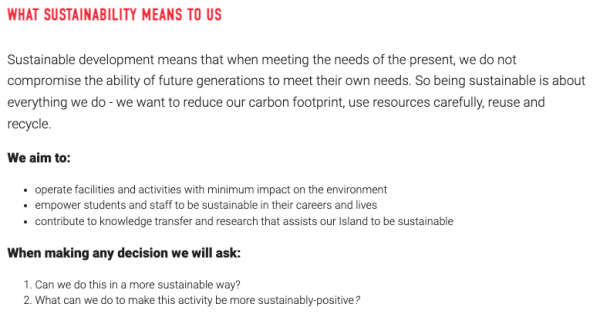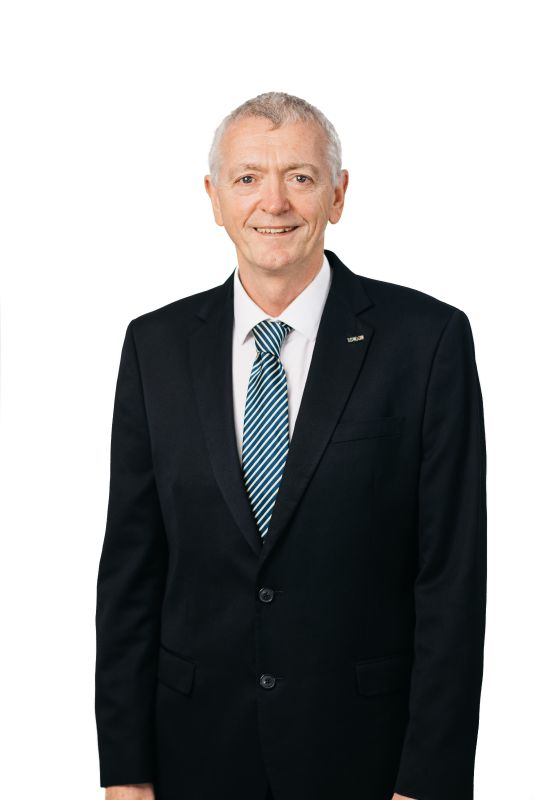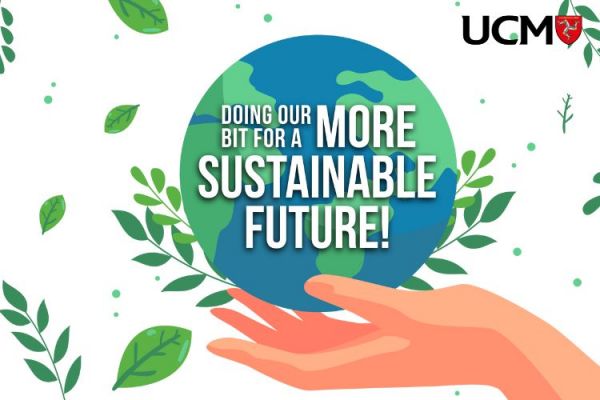University College Isle of Man (UCM) recently launched its Sustainability Model. Vice Principal Geoff Chatwood, who led the project to develop the model, shares his experience with us and hopes it inspires other organisations:
If you’d spoken to me 10 years ago about climate change, I’m ashamed to admit that I’d probably have been a bit sceptical. However, in the last few years I’ve become a bit obsessed with sustainability, as the team at UCM and my wife would tell you.
At UCM we’re really pleased to have launched our Sustainability Model. It has been quite a journey to get to this stage. For me personally, it’s been a real learning experience that has challenged me, but I can absolutely say that I am 100% convinced that we all need to be doing our bit.
Hopefully by sharing our experience we can encourage others to get involved.
Pre-pandemic, UCM had recognised that we needed to do something about our carbon footprint; one of our main ‘customer demographics’ is young people and the voice of young people on this topic is, rightly, very loud, so it’s important that we listen to it.
We created a working group to explore what we could do but then, of course, Covid 19 happened and we hunkered down, focusing on teaching our students and getting them through their qualifications.
As the world started opening up and life got back to normal, the topic was raised. New personnel, renewed interest and more spotlight on the subject gave the newly reformed working group momentum.
The group formulated UCM’s official Sustainability Statement as you can see below

…and, had this been a tick box exercise, we would have sent an all-staff email, put out a social media post and that would have been the story over.
But this isn’t a tick box exercise. We really do want to make a difference.
Around the same time, I attended the Association of Colleges Conference which was focussed on sustainability, and so began my voyage of discovery.
I’ve read lots of research about what is means to be green, how to get to net zero, being carbon neutral, carbon offsetting … the list goes on. I honestly found it overwhelming and a bit daunting.
UCM has some incredible facilities but when I was reading all this research and experiences from other colleges and organisations about how to measure and improve carbon footprint, I could not relate that to us. We don’t have a ‘smart building’ and lots of our vocational courses have to consume materials so we can’t just stop doing those activities; so, what could we do?
If your organisation is in a similar boat, the takeaway here is not to give up. Look at what you can do and what you can influence. Everyone can do something, and something is better than nothing.
Our first step was to understand what we currently consume, reuse and recycle, so we gained some basic stats, things like how much paper we use when printing, how many cans and bottles are recycled and how much staff travel we have. To make it more understandable, we put these into terms that people can relate to like ‘in the last academic year we used the equivalent of nine trees in our A4 size printers/photocopiers’ and ‘last year we produced enough uncompacted waste to fill the 8-lane swimming pool at the NSC’.
These weren’t good stats but if we wanted to make changes, we needed to face the reality of the situation so we put these on our website, shared with students, staff and governors, and asked these two stakeholder groups for their views.

Vice Principal of UCM Geoff Chatwood
We wanted to get their opinions, find out what appetite for sustainability they had and see the things they thought we should change.
There were no surprises from these surveys; staff and students want us to be more sustainable by reducing waste and conserving energy.
UCM is a big operation; we have six campuses, we have close to 3,000 students ranging from age 14 right through to people in their 90s, and our buildings are in use six days a week from 7.30am through to 8pm. It was clear that one person couldn’t direct this all themselves and there’s lots of things that impact our carbon footprint that we can’t affect.
Despite these hurdles, we carried on.
The management team would clearly be heavily involved in making UCM more sustainable, so we recognised it was important to ensure they had a good understanding of the whats, whys and hows of this topic.
We collaborated with City of Liverpool College to deliver the carbon literary training, making it mandatory for all managers.
The training was well received and I think it’s fair to say everyone who attended the training now has a really good grasp of the subject and is convinced that we need to make changes – they even got to sample some edible insects (although they weren’t convinced on switching from a meat to insects for their lunch just yet).
Behind the scenes the sustainability model was taking shape and I was regularly sharing progress with the sustainability working group and the senior leadership team.
In essence, the sustainability model breaks our operations down into five key themes (1) Leadership staff and governance which is how it links into the overall UCM strategy and how we monitor our footprint. (2) Learning, research and students which is about embedding sustainability within our curriculum, and training and supporting staff, students and the wider community to be more sustainable in their professional and personal lives. (3) Estates and operations look at how we use resources, whether that be in the running of our building, within our catering facilities or in our learning environments. (4) Partnerships and engagement which is about communicating what we’re doing, engaging the community and looking at the sustainability credentials of our suppliers. (5) Shared team activities focuses on bringing it all together to measure our carbon footprint, publish our data and develop the plan.

Each of those themes has a sub group which is led by a member of the senior leadership team, with the first four reporting in to the last who act as the control to make sure things are happening. The groups are made up of different members of staff based on their roles and expertise, and student representatives. It’s wonderful to see how many staff have come forward to get involved in this project. People really do want to make a difference.
To launch the model, we held a series of events. It was important to first communicate with our key stakeholders so we held events for our staff and students, before an official launch to the wider public at our UCM-organised Isle of Man Research Festival.
This was all in October and it’s exciting to see changes already happening.
The team for the partnerships and engagement theme have set up a dedicated space on our website giving updates about what we’re doing around sustainability, and there’s some great things happening.
Students have been visiting Douglas City Council’s recycling facilities to learn about recycling, our Student Services Team has launched a gift exchange and we’ve launched some adult learning courses around sustainability.
There’s lots more bubbling under the surface which we’ll report as the model progresses.
There are two things that are really important to note, things that I regularly remind the team at UCM. This model isn’t linear and it’s a marathon not a sprint.
The people responsible for the individual teams can tackle the activities in whatever order they wish; some are obviously more likely to come before others but it’s up to the team to decide. What we’re seeing so far is that they are commencing some of the activities that will take longer but getting a few ‘quick wins’ under their belt at the same time.
We want this to work in the long term so anything we do needs to itself be sustainable – something we can keep doing and keep improving to ensure that the impact we have leaves a lasting legacy.
The model and road map will be made available on our website this month.


